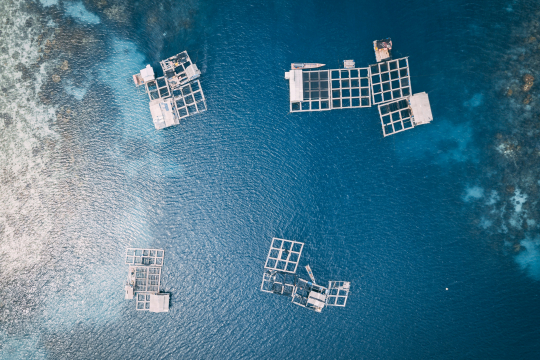Aquaculture, the fastest-growing food production technology, faces scrutiny over its environmental impact and social consequences. Recent data offers insights into the sustainability of various aquaculture systems worldwide.
A recent study utilizing Aquaculture Performance Indicators (API), sheds light on the sustainability outcomes of 57 aquaculture systems across the globe. The comprehensive analysis, encompassing 88 metrics, reveals significant variations in sustainability performance, highlighting opportunities for innovative policy measures and investment to align with sustainability objectives. The findings were part of a large study group that included EfD fellows - Håkan Eggert, Carlos Chávez, Nnaemeka Chukwuone, and Byela Tibesigwa.
New insights about aquaculture
The study finds that freshwater and marine aquaculture are equal from a sustainability perspective. This challenges the preconceived notions about the relative merits of these systems and suggests that policy and investment should focus on improving sustainability outcomes regardless of the water body used for production. In addition, monoculture systems, on average, scored higher across the three pillars of sustainability (economic, social, and environmental) compared to polycultures. This finding contradicts the belief that polycultures, which integrate multiple species, optimize resource use and sustainability.
Species-specific performance and market orientation
The study also compares the performance of key farmed species, such as salmon, tilapia, carp, shrimp, mollusks, and catfish. Filter-feeding mollusks, which do not require manufactured feeds, excel in environmental performance but lag in economic viability. In contrast, salmon scores well in most dimensions, reflecting the success of intensive, technologically advanced production systems. However, the high environmental costs associated with salmon farming, highlight the need for continued innovation and regulation to mitigate these impacts.
The study further reveals differences in sustainability outcomes between domestic and export-oriented aquaculture systems. In low-income countries, export-oriented systems outperformed domestic markets in environmental and economic performance. While, in high-income countries, domestic markets scored higher in environmental sustainability. These findings emphasize the need for nuanced policy and market strategies to enhance sustainability across different contexts.
A path forward: Achieving sustainable aquaculture
The APIs provide a robust framework for assessing the sustainability of aquaculture systems, offering valuable insights for policy and investment decisions. The study underscores the potential for sustainable aquaculture production and the importance of continued data collection and analysis to drive improvements in the industry. Expansion of the API database will enable more detailed assessments and help promote sustainability in global aquaculture.
While the aquaculture industry faces significant challenges, the data suggests sustainable production is achievable. With the right policies and investments, aquaculture can continue to support livelihoods, food security, and environmental health globally.
The study titled "Environmental, economic, and social sustainability in aquaculture: the aquaculture performance indicators" is published in Nature Communications, and can be accessed here.
